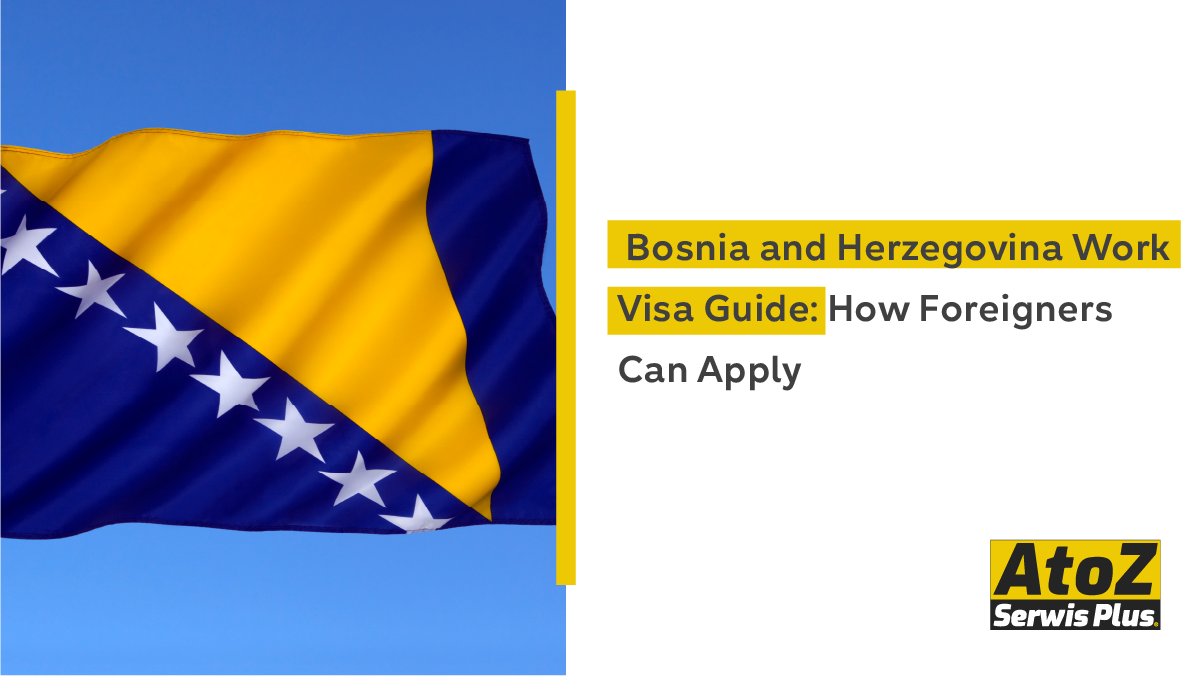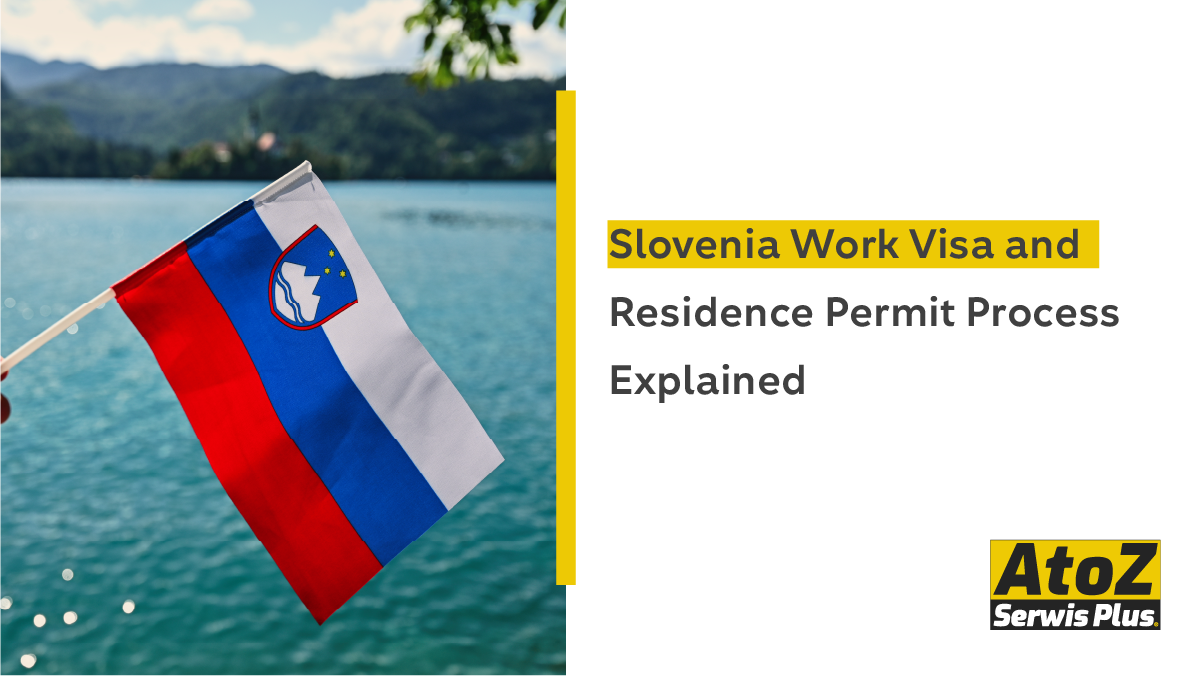

Bosnia and Herzegovina Work Visa Guide: How Foreigners Can Apply
Introduction to Bosnia
Bosnia and Herzegovina, often referred to simply as Bosnia, is a Balkan nation known for its cultural diversity, scenic landscapes, and affordable lifestyle. The capital city is Sarajevo, and the official currency is the Bosnia and Herzegovina Convertible Mark (BAM), which is pegged to the Euro for stability. Bosnia is not yet a member of the European Union or the Schengen Zone, but it holds official EU candidate status, indicating the country's progress toward closer integration with Europe. With a population of roughly 3.2 million, Bosnia is a smaller but steadily developing economy that is opening doors to foreign workers across industries.
Living and Working in Bosnia
Life in Bosnia is attractive to expatriates due to its low cost of living and welcoming environment. Rent, food, and transportation are all significantly cheaper compared to Western Europe. For example, a one-bedroom apartment in Sarajevo costs between €25 €400 per month, while smaller towns offer even lower prices. Healthcare is available through the public system; however, many foreigners opt for private clinics for faster access. Workers contribute to social security, which provides coverage for pensions, benefits, and basic healthcare. Safety levels are generally good, with friendly communities making it easy for newcomers to settle in.
Job Opportunities in Bosnia
Bosnia's economy is developing, and labour shortages exist in both blue-collar and white-collar sectors.
- Blue-collar jobs: Construction, transportation, welding, hotel staff, servers, and seasonal agricultural workers.
- White-collar jobs: IT specialists, engineers, healthcare professionals, finance experts, and teachers.
Average Salaries in Bosnia
|
Job Role |
Salary (BAM) |
Salary (EUR) |
|---|---|---|
|
Construction Worker |
1,200 |
~€615 |
|
Truck Driver |
1,500 |
~€770 |
|
Hotel/Waiter Staff |
1,000 |
~€510 |
|
IT Specialist |
2,500 |
~€1,280 |
|
Engineer |
2,000 |
~€1,025 |
|
Doctor/Nurse |
2,200 |
~€1,130 |
Salaries are lower compared to Western Europe, but Bosnia's cost of living allows workers to maintain a good quality of life.
Finding Jobs in Bosnia
The official government portal for finding work in Bosnia is the Employment Service of Bosnia and Herzegovina (Agencija za Rad i Zapošljavanje BiH).
Employment Service of BiH
This platform lists verified vacancies, ensures transparency, and provides guidelines for foreign workers applying for jobs and work permits.
Types of Work Permits in Bosnia
Foreign nationals need a valid work permit before starting employment. The main types include:
- Temporary Work Permit – Valid for up to one year, renewable.
- Seasonal Work Permit – For short-term jobs in agriculture, tourism, and hospitality (up to 6 months).
- Permanent Work Permit – For foreigners who have been working and living in Bosnia for several years.
- Intra-Corporate Transfer (ICT) Permit – For employees transferred within multinational companies.
Types of Work Visas in Bosnia
Foreign workers also require a visa to enter and reside in the country legally. Options include:
- Long-term National Visa (Type D) – For employment, valid for one year.
- Short-term Visa (Type C) – For business visits or stays up to 90 days.
- Work Visa Linked to Residence Permit – For more extended employment contracts.
Validity of Work Permits and Visas
- Work permits are valid for 6–12 months, depending on the contract, and can be renewed as needed.
- Seasonal permits are valid for up to 6 months.
- Type D visas are valid for 1 year, after which a residence permit is required for continued stay.
Step-by-Step Visa Application Process
- Secure a job offer from a registered employer in Bosnia.
- The employer applies for a work permit through the Employment Service.
- Collect required documents, including passport, contract, proof of accommodation, insurance, and police clearance.
- Apply for a Type D Visa at the Bosnian embassy in your home country.
- Travel to Bosnia once the visa is approved.
- Register your stay at the local police station within 48 hours.
- Apply for a Temporary Residence Permit at the Ministry of Security.
- Receive your residence card and begin working legally.
Required Documents for a Work Visa in Bosnia
- Valid passport (at least 6–12 months validity)
- Signed employment contract
- Proof of funds and financial stability
- Health insurance coverage
- Proof of accommodation (rental contract or employer-provided housing)
- Police clearance certificate
- Passport photos
- Completed application form and visa fee receipt
Accommodation and Real Estate in Bosnia
Housing in Bosnia is affordable compared to other European countries. In Sarajevo, the average rent for a one-bedroom apartment is €250–€400 per month, while smaller towns are significantly more affordable. Foreigners can also buy property in Bosnia, and all ownership details can be verified through the official Real Estate Cadastre.
Appeal Process for Visa Refusal
If your visa is refused, you may appeal the decision within 15 days of receiving the notice of refusal.. Stronger documentation, such as updated employer confirmation or proof of funds, can improve your appeal. The Ministry of Security reviews appeals, and many applicants choose to work with immigration experts to increase their chances of success.
Pathway to Permanent Residency in Bosnia
Foreign nationals can apply for permanent residency after 5 years of continuous legal residence. Those married to Bosnian citizens may qualify after 3 years. Applicants must prove employment, income stability, housing, and social integration.
Documents Required for Permanent Residency
- Previous residence permits
- Proof of employment or business activity
- Evidence of stable income and tax contributions
- Rental or property ownership documents
- Marriage or family certificates (if applying through family route)
- Proof of integration if required
Hiring in Bosnia
Employers in Bosnia hire both locals and foreigners, but hiring foreigners requires compliance with government work permit quotas. The process involves employer sponsorship and approval from the Employment Service.
Recruiting in Bosnia
Recruitment practices in Bosnia are straightforward, with job advertisements, interviews, and contracts regulated by law. Employers must avoid discriminatory practices.
Laws Against Discrimination in Bosnia
Bosnia has strict laws against workplace discrimination based on race, gender, religion, nationality, or disability. All employees have equal rights under the labour law.
How to Hire Employees in Bosnia
Employers must provide written contracts, register employees with tax and social security authorities, and comply with labour law requirements for wages, benefits, and working conditions.
Employment Contracts in Bosnia
Contracts must be in writing and include job description, salary, working hours, benefits, and termination terms. Probation periods are usually between one and three months.
Working Hours in Bosnia
The standard working week is 40 hours, with overtime compensated at higher rates. Employees are entitled to daily rest breaks and weekly days off.
Public Holidays in Bosnia
Bosnia observes both national and religious holidays. These officially recognised employees are entitled to paid leave on public holidays.
Vacation Days in Bosnia
Employees are entitled to at least 20 working days of paid annual leave. The entitlement increases with years of service and specific collective agreements.
Additional Leave in Bosnia
Employees may request extra leave for marriage, childbirth, examinations, or urgent family reasons. These leaves are regulated by labour law or collective agreements.
Sick Leave in Bosnia
Employees are entitled to paid sick leave, provided they can produce a medical certificate to support their claim. Employers cover the initial period, after which Social Security contributes.
Parental Leave in Bosnia
Both mothers and fathers are entitled to parental leave. Maternity leave is mandatory, while fathers can take paternity leave under specific conditions.
Termination and Severance in Bosnia
Employment can be terminated by either party with proper notice. Severance pay is provided in cases of redundancy or unlawful termination, based on years of service.
Onboarding in Bosnia
Employers must register new employees, introduce them to the workplace rules, and ensure they receive training on health and safety compliance.
Bosnia Employment Laws
Employment relationships in Bosnia and Herzegovina are governed by the Labour Law of Bosnia and Herzegovina, which establishes minimum standards for contracts, wages, and benefits.
Taxation Rules in Bosnia
Bosnia applies a flat 10% income tax rate on salaries. Employers are also responsible for contributing to pension, health, and unemployment insurance funds.
Bosnia Payroll Options for Companies
Companies can manage payroll internally, outsource to local payroll providers, or use Employer of Record (EOR) services to handle compliance and payments.
How to Establish Payroll in Bosnia
Employers must register with tax authorities, open local bank accounts, and comply with reporting obligations before processing payroll.
Bosnia Compensation Laws
Minimum wage levels are regulated by law, and compensation must comply with labour regulations. Overtime, bonuses, and allowances must be included where applicable.
Guaranteed Benefits in Bosnia
Mandatory benefits include paid vacation, maternity leave, sick leave, pension contributions, and health insurance coverage.
Restrictions for Benefits and Compensation
Employers must provide benefits within legal limits and cannot substitute mandatory entitlements with non-standard perks.
Bosnia Competitive Benefits Planning
To attract top talent, many employers offer competitive packages that include meal allowances, transportation support, and housing subsidies.
Bosnia Employee Benefits Plans
Standard plans include health coverage, pension contributions, and social security benefits. Some employers add private insurance or retirement plans.
Requirements for Employee Benefits in Bosnia
Employers must contribute to social insurance, health, and unemployment funds, ensuring workers' access to basic protections.
How to Design Your Employee Benefits Program
Employers can design benefit packages that combine legal requirements with additional perks to improve employee satisfaction.
Average Cost of Benefits per Employee
Employers should expect to contribute approximately 31%–33% of an employee's gross salary toward taxes and benefits.
How to Calculate Employee Benefits
Benefits are calculated as a percentage of gross salary, including pension, health, and unemployment contributions.
Employee Health Benefits Plans
Employees are automatically enrolled in Bosnia's public healthcare system through employer contributions. Some companies offer additional private healthcare plans.
How to Establish a Bosnia Subsidiary
Foreign companies may establish subsidiaries by registering with the local courts, obtaining a tax identification number, and setting up a regional office.
Bosnia Subsidiary Laws
Subsidiaries must comply with Bosnian company law, labour regulations, and tax rules. They operate as independent entities from the parent company.
Benefits of Establishing a Bosnia Subsidiary
Setting up a subsidiary allows foreign companies to hire locally, manage payroll, and operate under Bosnia's legal framework with greater flexibility.
Requirements to Obtain Bosnia Work Visas
Applicants must have a valid job offer, employer sponsorship, and supporting documentation, including proof of accommodation and insurance.
Application Process for Bosnia Work Visas
Applications are made at the Bosnian embassies abroad. Once approved, workers can travel to Bosnia, register locally, and apply for a residence permit.
Other Important Considerations for Bosnia Work Visas
Language skills, cultural adaptation, and compliance with renewal deadlines are essential for long-term success.
Official Government Resources
- Employment Service of Bosnia and Herzegovina (Agencija za Rad i Zapošljavanje BiH)
- Ministry of Security – Migration Department
- Ministry of Foreign Affairs (MFA)
- Social Security Administration (PIO/MIO)
- Real Estate Cadastre of Bosnia and Herzegovina
Start Your Journey with AtoZ Serwis Plus
Bosnia and Herzegovina is a growing destination for foreign workers seeking stable careers and affordable living in Europe. At Atospecializelus, we specialise in assisting international candidates with job placement, work permit applications, and visa processing. Whether you are seeking seasonal work, a skilled position, or long-term settlement, our team ensures a smooth and legal process.
Our Solutions
Connecting employers, job seekers, recruiters, and students with opportunities across Europe and beyond.
For Workers – Start Your Career in Europe
Looking for a stable job and a legal pathway to Europe?
We help non-EU citizens secure verified opportunities in various sectors, including construction, warehouses, factories, hospitality, agriculture, and logistics.
- Verified job offers
- Work permit & visa support
- Document preparation & training guidance
- Post-arrival support (housing, registration, settlement)
Apply Now – Worker Registration
For Employers – Hire Reliable Workers in Europe
Struggling with a labour shortage?
We connect European companies with vetted non-EU candidates, ensuring safe and legal recruitment.
- Recruitment of skilled and general workers
- Work permit & visa assistance
- Compliance and document verification
- Onboarding and post-arrival support
Register Your Company – Employer Registration
For Recruiters – Partner With Us in Europe
Are you a recruiter or agency?
We collaborate with trusted partners worldwide to provide a workforce for European employers.
- Partnership with a leading immigration consultancy
- Access to verified job opportunities
- Full visa & work permit support
- Transparent policies and long-term collaboration
Register Now – Become a Recruitment Partner
Truck Driver Jobs in Europe
For Drivers – Start Your Career in Europe
If you are a non-EU driver with a C+E license and want to work in Europe, AtoZ Serwis Plus can help you secure legal and well-paid truck driving jobs.
- Verified job offers with trusted logistics companies
- Complete assistance with work permits and visas
- Guidance for Code 95 training and license conversion
- Post-arrival support with housing and residence permits
Apply Now – Driver Registration
Final Thoughts – AtoZ Serwis Plus
The Moldova work permit and visa process is straightforward if you prepare your documents correctly and secure an employer willing to sponsor your application. At AtoZ Serwis Plus, we guide candidates through every step — from finding verified jobs to handling documentation, applying for permits, and providing post-arrival support.
Frequently Asked Questions (FAQs) about Working in Bosnia and Herzegovina
1. Do I need a work permit to work in Bosnia as a foreigner?
Yes, all non-citizens must obtain a valid work permit before they can legally work in Bosnia.
2. What is the difference between a Bosnia work permit and a work visa? A work permit authorises you to work. In contrast, a work visa (usually a Type D visa) allows you to enter Bosnia and stay legally for employment purposes.
3. How long is a Bosnia work permit valid?
Most work permits are valid for 6–12 months and can be renewed. Seasonal permits are valid for up to 6 months.
4. What is the validity of a Bosnia Type D Visa?
The national Type D Visa is valid for up to one year and must be followed by a residence permit for stays exceeding one year.
5. What jobs are most in demand in Bosnia?
Jobs in construction, transportation, hospitality, agriculture, IT, healthcare, and engineering are in high demand.
6. What is the average salary in Bosnia?
Salaries vary by sector, but the average monthly wage is around 1,500 BAM (€770). Professionals in IT, healthcare, and engineering typically earn higher salaries.
7. Is the cost of living in Bosnia affordable for foreigners?
Yes, Bosnia is significantly cheaper than Western Europe. Rent, food, and transport costs are all affordable, especially outside Sarajevo.
8. Can foreigners buy property in Bosnia?
Yes, foreigners can purchase property in Bosnia, and the Real Estate Cadastre manages ownership records.
9. What documents are required for a Bosnia work visa?
Key documents include a valid passport, employment contract, proof of funds, health insurance, accommodation proof, police clearance, and application forms.
10. How do I apply for a Bosnia work visa?
You must first secure a job offer, and then your employer will apply for your work permit on your behalf. After approval, you apply for a Type D Visa at a Bosnian embassy.
11. What is the process if my Bosnia visa is refused?
You can submit an appeal within 15 days of refusal by providing stronger supporting documents, such as employer confirmation or financial proof.
12. How many years must I live in Bosnia to get permanent residency?
You must live legally in Bosnia for 5 years, or 3 years if married to a Bosnian citizen, to qualify for permanent residency.
13. What benefits do employees in Bosnia receive?
Mandatory benefits include paid vacation, sick leave, maternity leave, health insurance, and pension contributions.
14. How many vacation days do employees get in Bosnia?
Employees are entitled to at least 20 working days of paid annual leave per year.
15. What are the working hours in Bosnia?
The standard workweek is 40 hours, with overtime regulated by law and compensated at higher rates.
16. Do employees get sick leave in Bosnia?
Yes, employees are entitled to paid sick leave if supported by a medical certificate. Employers and social security share the costs.
17. What taxes do employees pay in Bosnia?
Bosnia has a flat 10% income tax rate. Employers also contribute to pension, health, and unemployment insurance.
18. What is the role of the Employment Service of Bosnia?
The Agencija za Rad i Zapošljavanje BiH is the official government job portal, managing vacancies and work permit quotas.
19. Can companies hire foreigners easily in Bosnia?
Yes, but employers must first check with the Employment Service for permit quotas and provide sponsorship for the work permit process.
20. Why should I use AtoZ Serwis Plus to work in Bosnia?
AtoZ Serwis Plus helps you secure job offers, manage paperwork, and guide you through every step of the work permit and visa process, ensuring a legal migration experience.

















